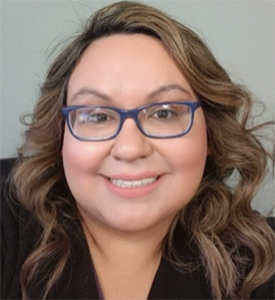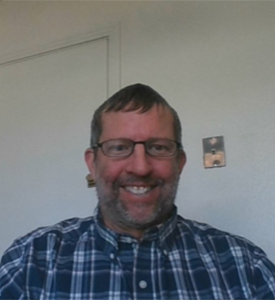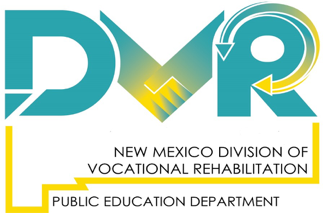Working at DVR: Hear from our Counselors
Learn more about what it takes to become a Vocational Rehabilitation (VR) counselor with DVR. Read the following Q&As with a few of our counselors.

Meet Rebecca Trujillo, Vocational Rehabilitation (VR) Counselor, Las Vegas
Why did you become a VR counselor? What inspired you?
I became a VR counselor because I saw the impact it had on one of my best friends and how much she has benefited from DVR. I have always been someone who can be described as a go-getter. I wanted to be able to help others reach their goals and impact their lives in a positive way.
What kind of educational and training requirements do you need to meet before applying to become VR counselor?
To become a VR counselor, most importantly must want to help individuals better their lives. I am a Licensed Bachelor Social Worker (LBSW). I have been one for 3.5 years. In order for someone to become a VR Counselor they must have at least a bachelor’s degree from an accredited college or university in vocational rehabilitation, sociology, psychology, guidance and counseling, social work and/or special education.
What advice would you give to someone considering a new career as a VR counselor?
Some advice I would give someone considering a new career as a VR counselor would be that it is a rewarding career. Working for an agency that allows you to put your family first and then your job. It is nice to have people that work as a team. I love the Area I work in because anytime I feel like I’m having a hard time they are there to have my back.
What is your typical day like?
Unfortunately, I started my job during the pandemic working from home. When I started at DVR I was one week away from having my beautiful daughter. I then went on maternity leave for 3 months. When I went on maternity leave, everyone was so understanding and held my caseload up until I returned. They were there to help me navigate the obstacles from learning from home. I have the privilege of watching my kids from home and work because of the pandemic. I love working from home and seeing my kids every day. I love that DVR cares about our safety though the pandemic. I am excited to see how things will be in the future when things are a little more “normal” and we are working back in the office. A typical day for me is setting up and preparing for the day. I often keep in close contact with my amazing rehab tech that I work so closely with. I usually have my appointments scheduled in advance for the week. A typical day for me is reminding myself that this job requires my participant’s and I to work together to accomplish their goal.
What are the best things about your job?
The BEST thing about my job is my amazing TEAM. The team I work with is the best team I could have asked for. I like having people that understand we aren’t perfect, and we have lives outside of DVR. I like how everyone is more like family.

Meet Jennifer Saavedra, Vocational Rehabilitation (VR) Counselor, Albuquerque
Why did you become a VR counselor? What inspired you?
Years ago, before I knew about the Division of Vocational Rehabilitation, my friend’s son was attending a Montessori elementary school and she was advised that her son should be tested as they did not feel he was a good “fit” for their school. Soon after, her son was diagnosed with high functioning autism. The Montessori school recommended that they find him a different school. As a parent, being told that your son or daughter has a disability can be hard to understand, and my friend and her husband were no different. They had been given their son’s diagnosis and thought, “Now what?”
Watching them go through the process of finding a new school and the appropriate resources to help their son inspired me. I developed a strong desire to work with individuals with disabilities. I decided to go back to UNM to finish my undergraduate degree in psychology. Throughout my studies, I learned about the high unemployment rates for individuals with disabilities and focused a lot of my research on autism spectrum disorder and unemployment. I knew then that I wanted to help change these high unemployment rates. After obtaining my bachelor’s degree from UNM I began to research graduate programs and came across the Counseling: Rehabilitation Program through New Mexico Highlands University. I applied for and was accepted to the program. Around the same time, I also saw a job posting for a counselor with the Division of Vocational Rehabilitation and applied. That is how I found myself at DVR. I didn’t know exactly what to expect but I knew that I wanted to help individuals with disabilities find meaning and purpose in their life which includes meaningful employment.
What kind of educational and training requirements do you need to meet before applying to become VR counselor?
Before applying to become a VR counselor, you will need to possess a bachelor’s degree in a related field to be considered for the job. However, it is extremely helpful to have case management and counseling experience as these are very important skills for the job. Prior to applying to become a VR counselor you should consider a master’s degree in counseling or social work as I feel it better prepares you to understand the counseling aspect of the job.
What advice would you give to someone considering a new career as a VR counselor?
Working as a VR counselor is a rewarding career. It provides stability and opportunity for advancement and you work with great people. I also think it is important to be passionate about the work we do as each participant is different. They are not just a number; they have different barriers and needs. Working as a VR counselor is continuously changing as we work towards meeting the requirements set in place by the Workforce Innovation and Opportunity Act (WIOA). So, the ability to adapt to change is also very important.
What is your typical day like?
On a typical day I have 4-5 participant appointments scheduled. In between appointments there is paperwork as well as phone calls and emails to be taken care of. In between the work, it is important to stay up to date on community resources, job boards, and your personal continued education. We also work with students with a disability (SWD) and assist them in their transition from high school to the workplace. So, some days or parts of the day may be spent in local high schools. Each day at DVR can be very different. You must be flexible as something may come up that was not planned for but requires immediate attention.
What are the best things about your job?
I enjoy being able to help individuals find a sense of purpose in the community. The change I witness in an individual who secures employment when they had lost all hope of ever being able to find work is so rewarding. I also enjoy helping SWD figure out what they want to do after high school and helping them work towards achieving their goals for employment. The team of people at DVR makes it easy to get through each day at work. Everybody is so helpful and always willing to answer questions or help as needed.

Meet William Hines, Vocational Rehabilitation (VR) Counselor, Edgewood
Why did you become a VR counselor? What inspired you?
I became a VR counselor because I wanted to combine my school counseling experience with the challenge of assisting clients with obtaining employment.
What kind of educational and training requirements do you need before applying to become VR counselor?
One need only have a bachelor’s Degree, preferably in a counseling/social work/human services related area, before applying to become a VR Counselor.
What advice would you give to someone considering a new career as a VR counselor?
To those considering a career as a VR Counselor, be prepared and practice your multitasking skills. This is part of the job.
What is your typical day like?
My typical day begins with checking my e-mails, responding to e-mails, calling participants for information, and conducting Intake Interviews and attending school IEPs. My day ends with writing eligibility determinations, writing IPEs, and other case management responsibilities such as “activity due” deadlines, and contacting participants as part of monthly check-ins.
What are the best things about your job?
The best things about my job include the satisfaction of assisting an individual with obtaining employment they find challenging and rewarding. Another thing I really like about my job is the fact that no two days are the same, and unexpected challenges come up all of the time.
